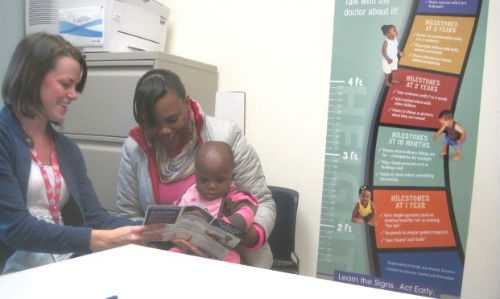WIC and Other Family Service Providers

You are a valuable resource to parents! They look to you for information about their child, and they trust you. “Learn the Signs. Act Early.” has resources to help educate parents on the full range of child development.
A Helpful Toolkit for WIC Providers!
1 in 6 children has developmental delays or disabilities. Children from families with low incomes, like those served by WIC, are at even greater risk. You can make a difference for these children by using the free resources described below and making a referral when there is a concern.
Using CDC’s “Learn the Signs. Act Early.” resources within WIC settings can:
- Help staff respond to questions or concerns from parents about their child’s development.
- Provide a quick and easy way to monitor a child’s early development.
- Help parents set goals related to their child’s growth and development.
- Offer parent education about developmental milestones and tips for supporting their child’s development.
- Help staff know when and where to refer a child with a possible developmental delay.
Note: These materials support developmental monitoring, but do not replace developmental screening. They help staff decide when to refer a child to other professionals for screening and further assessment.
It’s Working in WIC!
WIC clinics in Missouri have developed a model to successfully integrate CDC’s Learn the Signs. Act Early. Research shows that the model is highly acceptable to staff and families and works to identify and support children at risk.
96% of WIC staff referred one or more children with suspected delays
80% of WIC staff report that implementation takes less than 5 minutes
The model includes:
- Engaging imagery on the walls and floors of the clinic introduce milestone monitoring in a fun and friendly way.
- Parents completing milestone checklist while staff complete data entry tasks.
- Brief discussion of the completed checklist and referral to the child’s healthcare provider and/or early intervention program when concerns are noted.
To learn more about the Missouri WIC program, visit the program web page or contact ActEarly@cdc.gov.
WIC staff can help children with suspected developmental delays receive the help they need by:
Promoting Parent Awareness
- Integrate LTSAE developmental milestone checklists into clinic visits.
- Provide parents a checklist to complete at regular intervals, such as certification visits.
- Review the completed checklist with parents, and encourage them to share it with their child’s healthcare provider.
- Provide parents the Milestone Moments booklet or the link to the Milestone Tracker App, and encourage them to monitor development between visits.
Making a referral
- Refer to the child’s healthcare provider and/or early intervention program, when needed, for formal screening and assessment.
- Support parents in following up on concerns by sharing CDC’s tip sheets on How to Help Your Child and How to Talk with the Doctor.
The information on this page is available to download and print in a one-page pdf format in both English and Spanish:
Primer in English [PDF – 1 MB] Primer in Spanish [PDF – 1 MB]
Links to other Websites
The WIC Works serves as a resource system that provides online education and training centers for staff of the Special Supplemental Nutrition Program for Women, Infants and Children (WIC). WIC Works provides links to other Internet sites as a service to health and nutrition professionals.
NWA is the non-profit education arm and advocacy voice of the Special Supplemental Nutrition Program for Women, Infants and children (WIC).
- Page last reviewed: July 6, 2017
- Page last updated: July 14, 2017
- Content source:



 ShareCompartir
ShareCompartir